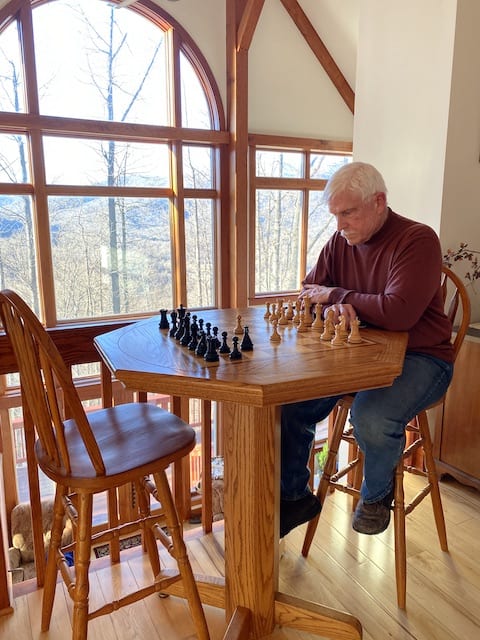Keith and I cuddled together under throw blankets on the downstairs sofa and watched a recording of the 2020 bio-drama “Critical Thinking.” It was a chilly night, but we were warm and toasty thanks to the fire Keith had burning in the wood stove. The movie was based on the true story of the 1998 Miami Jackson High School chess team, the first inner-city team to win the U.S. National Chess Championship.
Cuban-American teacher Mario Martinez—known as Mr. T to his students—teaches “critical thinking,” a chess elective for academic misfits. In a classroom scene, Mr. T, played by actor/director John Leguizamo, writes the word “Zugzwang” on the board. Keith, an avid chess player, paused the movie.

“Do you know what that term means?” he asked. Though I knew the names of the pieces—king, queen, rook, bishop, knight, pawn—and several common chess terms used in everyday vocabulary—checkmate, check, stalemate, endgame—I didn’t know what Zugzwang meant. So, I shook my head.
“It’s a German word. It means the player who has the move is at a disadvantage because any possible move he makes weakens his position. Everyone should know the idea behind Zugzwang. It’s about biding your time, often with what appears an innocuous move, and compelling your opponent to make the losing move. Waiting can be a good life strategy.”
***
Zugzwang combines two German words: Zug, meaning “move,” and Zwang, meaning “compulsion,” or compelled to move. In checkers and chess, when it’s a player’s turn, he or she must make a move. Being in zugzwang means the player obligated to move must make a disadvantageous move that will probably lose the game.
In most chess positions, players benefit from it being their turn to move, and they can improve their situation. But in zugzwang, a player is obligated to make important concessions. A win might still be possible, if the opponent makes an unwise move or doesn’t manage his time, but loss for the player in zugzwang is more likely. Perhaps the best he can do is to ask for a draw—and there’s a life lesson in that, too. It is half a loaf, because a draw nets both players 0.5 points. A win earns 1.0 points, loss 0.0—including loss on time.
***
Keith and I cheered as the scrappy African-American and Latino team that Mr. T accompanied to regional, state and national competitions prevailed and overcame difficult situations outside of school: an alcoholic single parent, hunger and homelessness, drug dealers and murders on the streets where they lived. In their Critical Thinking class, the students learned to apply the lessons of chess to advantage them in life, giving order to chaos. Most often, they chose moves that led to wins. They also accepted loses—with Mr. T’s admonishments and guidance to do so with grace.
They learned how to sit back, wait, watch, and think. Good lessons for us all.



Good thoughts for event happening in our government these days – sit back, wait, watch, think and I’ll add trust!
My thinking, too, Martha.Thank you for your comment. -C.D.
I can tell Keith knows his way around a chess board. I cannot say the same for me, but I appreciate learning a new word “zugzwang” to add to my vocabulary. I like how Mr. T brought critical thinking into his classroom with an innovative, hands-on approach.
Keith has been playing chess since high school. When his team won state, their prize was to play Bobby Fischer. Pretty cool, huh? The movie Critical Thinking is worth the watch… only a few moments of Hollywood posturing.